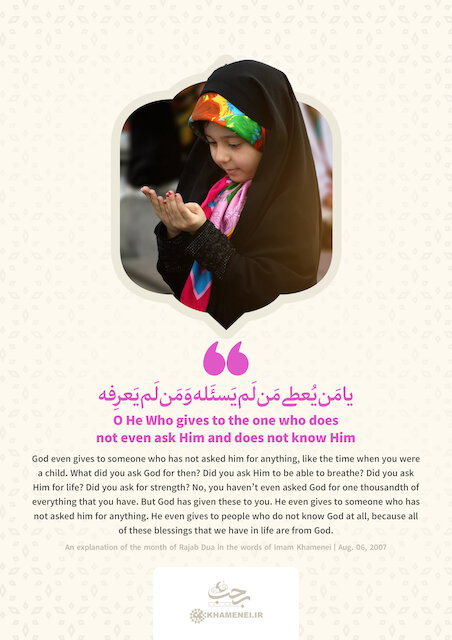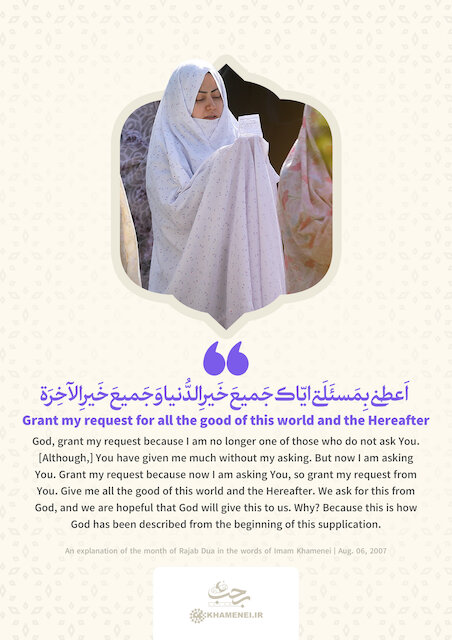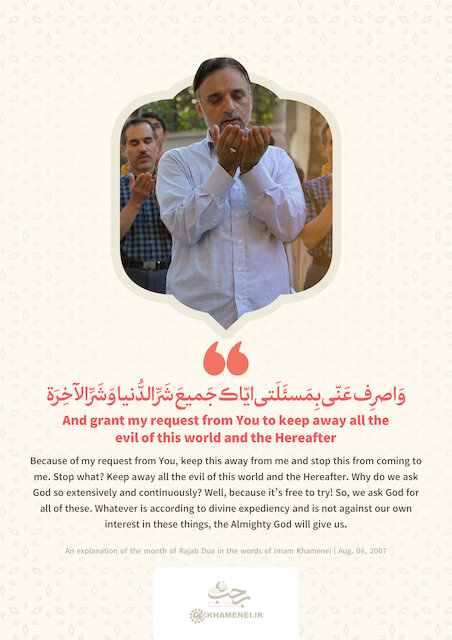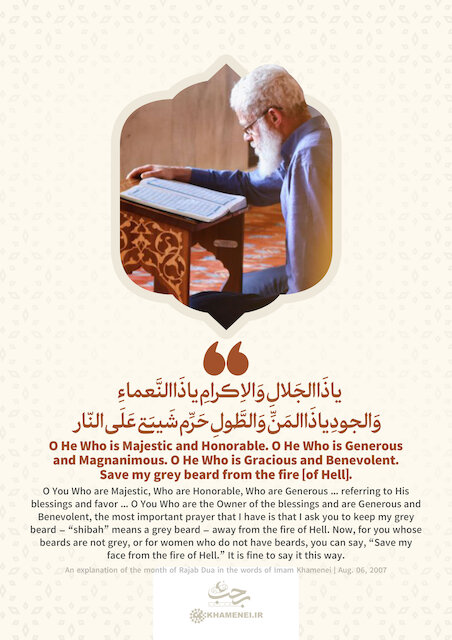“O He from Whom I hope for all goodness...”
O He in Whom I have hope if I do a good deed! In other words, I have hope in receiving His reward. … If you do an evil deed, you see yourself to be safe from His wrath. … We have done so many evil deeds and He has not shown His anger to us. We now feel we are safe from His anger if we do bad deeds. Our relationship with God is a relationship of God’s abundant forgiveness and abundant grace toward us.
Imam Khamenei
Aug. 06, 2007
“O He Who gives much in return for a little”
O You Who give a big reward for a small deed! Consider what we do in the way of God, whether it’s forgiving others or putting in effort, well, these are not important. How important are our deeds in comparison with the divine blessings that God gives us in return? What does God give us in return? He gives Heaven, His satisfaction, and the blessings in the Hereafter, which are very big and very important.
Imam Khamenei
Aug. 06, 2007
“O He Who gives to the one who asks Him”
God will give to whoever asks Him for something. This is a reality. You should know that [if] a person asks God for something, He will give it to him. If you see that your prayer is not answered, either you have not asked for it in the right way, or there is some expediency preventing it, or there is a major obstacle to it, or it is against the divine traditions in creation. Because the divine traditions in creation do not allow every prayer or every desire to be granted. But if these obstacles do not exist, the Almighty God will grant whatever you ask from Him.
Imam Khamenei
Aug. 06, 2007
“O He Who gives to the one who does not even ask Him and does not know Him”
God even gives to someone who has not asked him for anything, like the time when you were a child. What did you ask God for then? Did you ask Him to be able to breathe? Did you ask Him for life? Did you ask for strength? No, you haven’t even asked God for one thousandth of everything that you have. But God has given these to you. He even gives to someone who has not asked him for anything. He even gives to people who do not know God at all, because all of these blessings that we have in life are from God.
Imam Khamenei
Aug. 06, 2007
But He gives due to His Compassion and Mercy
So, what is the origin of this magnanimous behavior, favors, and kindness from the Almighty God? It is because, “He gives due to His Compassion (tahannon).” Tahannon means a feeling of compassion. “Hanan” means favor, closeness, taking care of something, taking care of someone because of his favor for you and to take care of you. And rahamah means these are because of God’s Grace and His Mercy on you. The Almighty God created humankind for this reason, "Except those on whom your Lord has mercy; and that is why He created them" (Quran 11:119). He created people to have mercy on them.
Imam Khamenei
Aug. 06, 2007
"Grant my request for all the good of this world the Hereafter"
God, grant my request because I am no longer one of those who do not ask You. [Although,] You have given me much without my asking. But now I am asking You. Grant my request because now I am asking You, so grant my request from You. Give me all the good of this world and the Hereafter. We ask for this from God, and we are hopeful that God will give this to us. Why? Because this is how God has been described from the beginning of this supplication.
Imam Khamenei
Aug. 06, 2007
"Grant my request from You to keep away all the evil"
Because of my request from You, keep this away from me and stop this from coming to me. Stop what? Keep away all the evil of this world and the Hereafter. Why do we ask God so extensively and continuously? Well, because it’s free to try! So, we ask God for all of these. Whatever is according to divine expediency and is not against our own interest in these things, the Almighty God will give us.
Imam Khamenei
Aug. 06, 2007
“For indeed, what is given by You does not have any lacks”
This is because there are no lacks in whatever You grant me, there are no shortages in it since all these worlds are like a grain of sand in the eyes of the Creator of these worlds, the One Who is influential in these worlds. For you and for me, for example, 1,000 tomans is more than 100 tomans. We are like this. But suppose a person has billions of tomans. He makes billions of tomans. There is no difference at all between 1,000 tomans and 100 tomans for him. 100 tomans, 1,000 tomans, 10,000 tomans, or 100,000 tomans – there is no difference between these for him.
Imam Khamenei
Aug. 06, 2007
“O He Who is Majestic and Honorable. O He Who is Generous and Magnanimous. O He Who is Gracious and Benevolent. Save my grey beard from the fire [of Hell].”
O You Who are Majestic, Who are Honorable, Who are Generous … referring to His blessings and favor … O You Who are the Owner of the blessings and are Generous and Benevolent, the most important prayer that I have is that I ask you to keep my grey beard – “shibah” means a grey beard – away from the fire of Hell. Now, for you whose beards are not grey, or for women who do not have beards, you can say, “Save my face from the fire of Hell.” It is fine to say it this way.
Imam Khamenei
Aug. 06, 2007
Endeavoring to understand the meaning of supplications
Is it better if a person prays with understanding or not? What if he/she doesn’t understand the meaning? It’s like a person who is just repeating some meaningless words. This isn’t very useful. Nonetheless, if he is paying attention to the fact that he is talking with God, it is not useless, but it is very different from when one knows what he is saying. Moving one’s index finger [as has been mentioned in the prayer] is because we are beseeching God. This was something common to do at that time. If you don’t move your finger now, that’s fine. That’s not a problem, because this is not common at this time. At that time this action was done to express their interest, devotion, and neediness to God.
Imam Khamenei
Aug. 06, 2007












Comment